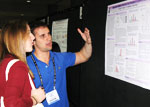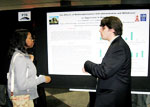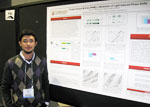(November 4, 2009)
Contact: Rick DelaHaya, Centenary News Services, 318.869.5073.
Neuroscience Majors Visit Chicago To Present Research
SHREVEPORT, La— Several Centenary College students had the opportunity recently to take part in a premier venue for neuroscientists to share research findings and experience cutting-edge research when they attended the Society for Neuroscience's 39th Annual meeting, Neuroscience 2009.
Held October 17-21st in Chicago, Ill., the event drew more than 30,500 neuroscientists from around the globe, and is the world's largest conference devoted specifically to neuroscience and neurological research.

John Cefalu

Mark Moehle

Marco Rajo
Neuroscience majors John Cefalu, Mark Moehle and Marco Rajo presented their research at the Faculty for Undergraduate Neuroscience (FUN) poster session. FUN represents the voice of undergraduate neuroscience within the Society for Neuroscience. In partnership with Project Kaleidoscope, FUN has brought faculty together from across the country to discuss, develop, and refine undergraduate neuroscience education. The organization provides an array of resources for faculty, and sponsors student travel awards and a poster session so that the best and brightest of undergraduate researchers can both attend and present work at the Society's annual meeting.
The three student's presentations were among the 14,700 posters and 1,700 talks given during the four-day event. Research presented by the Centenary students was quite diverse. John Cefalu presented new findings related to macular degeneration in his poster Expression Studies of Hu-Cox-2-Luc promoters in ARPE-19 cells. Mark Moehle discussed his ongoing project The Effects of Methamphetamine Self-administration and Withdrawal on Aggression in Male Rats. Marco Rajo's project, Protein Kinase M Zeta (PKMζ) a Modulator of Light-Induced Phase Shifts, examined the molecular regulators of circadian timing in mice
"Students who have the opportunity to present their data at a national meeting like the Society for Neuroscience conference, gain firsthand experience with the excitement of science," said Dr. Greg Butcher, Assistant Professor of Neuroscience. "This year our students were able to hear talks by a noble laureate, leading experts on memory, circadian timing, neurodegenerative disease, and two professional magicians, Apollo Robbins and Eric Mead. The latter two discussed how neuroscience research into attention and false memory is beginning to catch up to century old knowledge most professional magicians take for granted."
Funding to support the student travel to the meeting was provided by the Provost's Travel Fund, the Centenary Student Government Association and the Neuroscience Professional Development Award. The development award was established in 2008 by Neuroscience program coordinator Dr. Greg Butcher to provide travel awards for Centenary students to present their neuroscience research at a national meeting. Contributions to this fund are exclusively used to support neuroscience student travel. Donations to the Neuroscience Professional Development Award can be arranged through the Centenary Development Office email, 1-800-259-6447.
About Centenary College of Louisiana
Centenary College is a private, four-year arts and sciences college affiliated with the United Methodist Church. Founded in 1825, it is the oldest chartered liberal arts college west of the Mississippi River and is accredited by the Southern Association of Colleges and Schools. Centenary is one of 16 colleges and universities constituting the Associated Colleges of the South and has been recognized as "One of the Best 371 Colleges" by the Princeton Review and one of "America's Best Colleges" and one of "America's Best Private Colleges" by Forbes.com. In 2008 Centenary College celebrated 100 years in Shreveport and Bossier City.
